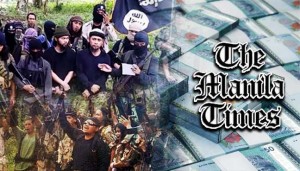Connivance

Admitting to have paid the ransom means accepting that abduction is not crime, but a form of commercial transaction.
Tan Tian Yan, Sin Chew Daily
The Malaysian hostage held by the Philippine militants are back safely.
To be honest, it is not very easy to get this far, and their safe return is enough cause for celebration. All disputes should come to a close.
That said, Malaysians are a truly confused lot.
The police said, “No ransom paid.”
The hostages’ families argued, “Ransom paid. RM12 million handed to the police.”
DPM said, “That’s not ransom. The money was handed to a specific organisation for welfare and other legal uses.”
IGP then added, “The police did not take nor hand over the money. Even if yes, it’s by a third party agent.”
So, who’s not telling the truth? Let’s put them all under the microscope.
Common sense tells us that the kidnappers are not running a charitable business. If no ransom was paid, the hostages’ fate would be like that of Canadian Robert Hall.
But, from the police standpoint, they must not admit to have paid the ransom or would be seen as having compromised with the abductors.
The police are an enforcement institution to safeguard the effectiveness of the country’s laws as well as self esteem. The laws have their binding power and are accepted by the public because of a righteous principle that must not be compromised.
No ransom must be paid and absolutely no compromise with the evildoers, even if it means some lives may have to be sacrificed in order to uphold this principle.
A compromise will shatter the principle and crush the credibility and binding power of the laws.
Admitting to have paid the ransom means accepting that abduction is not crime, but a form of commercial transaction.
That explains why the Canadian government has been so insistent not to pay any ransom.
But, Asians are generally less insistent where laws are concerned. And since a human life is priceless, laws can take a back seat wherever possible.
So, heavens know that all the Abu Sayyaf captives have been able to come back alive because the price tags on their heads have been satisfied.
A Sabah friend who has some knowledge of the abductions told me the series of kidnappings over the years has slowly evolved into a kind of commercial transaction that includes things like how and who to negotiation and how to hand over the ransom of the agreed amount.
After an abduction has been conducted and the hostages transported to Abu Sayyaf’s camp and well concealed from public eyes, a message will be sent and the Malaysian side will get people to start the negotiation process (the final price is normally in the vicinity of RM3 million per head). In the end, one side hands over the ransom and the other side releases the captives.
In past cases, normally some politicians would try to get the corporate sector to donate the ransom but not everything there is someone willing to come up with that money.
So, the families of the Sibu hostages have to seek donations from the public.
Once the sum has been raised from the public, they are duty-bound to explain to the public how the money has been spent, especially at a time when politicians have cooked up the issue in the run-up to the state elections.
The moment the police denied having paid the ransom, donors became skeptical and the families were put under mounting pressure.
To clear their name, the hostages’ families had no choice but to declare that the ransom had been handed to the police Special Branch.
And this put the police in utter embarrassment. They had no choice but to outright deny the families’ claim.
People with hidden agendas, in particular the politicians, found this an excellent opportunity to hammer the police.
To be honest, such a fiasco is not necessary at all.
If we were to learn from Canada’s example, things will be much easier. The government and police will not compromise to the least in any future abduction cases. No ransom will be paid and no involvement in any form of negotiation and dealing with the criminals.
The eventuality is most positively like Robert Hall’s: Dead for sure!
But, the confused Malaysians will definitely not accept this formula. If any hostage is beheaded, the people will direct their wrath at the government for not protecting its citizens. To avert public pressure, the government will soften its stance, and satisfy the kidnappers’ demand.
Why keep pursuing where the money has gone? Sure enough it has gone to the high speed motorboats the kidnappers have newly acquired, the rookies they have enlisted, and the heavy weapons they have purchased, so they can carry out more kidnappings.
With abductions taking place so regularly in our waters, we still keep pointing fingers at one another.
Security lapse is a reality and it is imperative that the government look into this very seriously. But, it is also a fact that we have connived at the criminal acts of the kidnappers.
Unless we have made up our mind not to pay a single cent of ransom in future.

